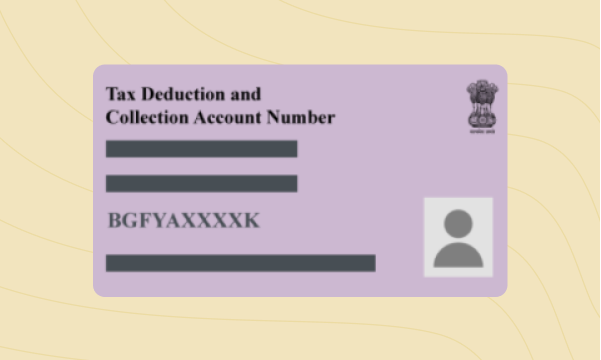Starting at Just Rs. 699/- (All Inclusive)
TAN Application
- it’s super simple
- completely online
- hand-holding support
- instant response & consultation


it's pocket friendly

it's hassle free

it's instant

it's completely online
Explore various pricing plans
All Inclusive Transparent Pricing #NoHiddenCharges
ITR-1 @ Rs. 699/-
- Salary Income
- Rent Income From One Property
- Interest Income etc.
This pricing plan includes free consultation
Fill inquiry form below to pay later
ITR-2 @ Rs. 1099/-
- Salary Income
- Rent Income From Properties
- Capital Gains or Losses
This pricing plan includes free consultation
Fill inquiry form below to pay later
ITR-3 @ Rs. 1999/-
- All Income Covered in ITR-2
- Income From Business or Profession
- Interest Income etc.
- Income or Loss From Intraday Share Trading
- Income or Loss From Derivatives (F&O)
- Director/Patner in a Company/LLP
This pricing plan includes free consultation
Fill inquiry form below to pay later
ITR-4 @ Rs. 1499/-
- Salary Income
- Rent Income From Propeties
- Professional Receipts up to Rs. 50 Lacs
- Businesses Covered under Presumptive Taxation
This pricing plan includes free consultation
Fill inquiry form below to pay later
Client's Voice is Essential!
h1 {
font-family: Montserrat, sans-serif;
color: black;
text-align: left;
}span {
color: #1cbbfb;
}@media only screen and (max-width: 600px) {
h1 {
font-size: 20px;
}
}Know More
Tan Application
An Overview
In the context of income tax, “TAN” stands for Tax Deduction and Collection Account Number. TAN is a unique 10-digit alphanumeric code issued by the Income Tax Department in India to entities responsible for collecting and deducting tax at the source.
TAN is primarily used for tracking and monitoring tax deductions made by individuals or organizations. It is mandatory for entities making TDS (Tax Deducted at Source) or TCS (Tax Collected at Source) payments. TAN should be quoted on all TDS/TCS returns, challans, and certificates issued.
To obtain a TAN, an application needs to be filed with the Income Tax Department along with the necessary documents and fees. Once the application is processed and approved, the TAN is issued to the entity.
Having a TAN is crucial for compliance with tax regulations and ensures proper reporting and remittance of taxes deducted or collected at the source.
Is It Mandatory?
The Tax Deduction and Collection Account Number (TAN) is mandatory for entities responsible for deducting or collecting tax at source in India. Under the Indian income tax laws, entities such as individuals, businesses, and organizations that make TDS (Tax Deducted at Source) or TCS (Tax Collected at Source) payments are required to have a TAN.
The TAN is a unique 10-digit alphanumeric code issued by the Income Tax Department. It helps in identifying and tracking the tax deductions or collections made by the entity. The TAN must be quoted on all TDS/TCS returns, challans, certificates, and other relevant documents.
Information / Documents Required
- To apply for a Tax Deduction and Collection Account Number (TAN) in India, you will need to provide certain information and documents. Here are the typical requirements:
- Identity proof: You should provide a copy of identity proof, such as PAN card, Aadhaar card, voter ID card, passport, or driver’s license.
- Address proof: A copy of address proof is required, which can be a utility bill (electricity bill, telephone bill, etc.), bank statement, ration card, or any other document issued by a government authority containing your address.
- Proof of entity: Depending on the type of entity, you need to provide relevant documents. For example:
- For individuals: Copy of PAN card
- For companies: Copy of Certificate of Incorporation or registration document
- For partnership firms: Copy of Partnership Deed
- For trusts, associations, etc.: Copy of Trust Deed or registration document
Due Date
The Tax Deduction and Collection Account Number (TAN) does not have a specific due date. The due dates in the context of taxes generally refer to deadlines for filing tax returns, making tax payments, or submitting various tax-related forms.
However, if you are referring to the due date for obtaining a TAN, it typically depends on when you are required to deduct or collect tax at source. Once you are liable to deduct or collect tax at source, it is advisable to apply for a TAN at the earliest to ensure compliance with the tax regulations. It is important to obtain a TAN before making any tax deductions or collections.
Benefits
TAN is a mandatory requirement for entities making tax deductions or collections at source. By obtaining a TAN, you ensure compliance with the tax regulations and avoid legal consequences or penalties for non-compliance.
TAN helps in proper reporting of tax deductions or collections. It allows the Income Tax Department to track and monitor the tax amounts deducted or collected by the entity, ensuring transparency and accountability in the tax system.
TAN provides a unique identification number for each deductor or collector of tax. It helps in distinguishing and identifying different entities involved in tax deductions or collections, making it easier for the tax authorities to maintain records and track transactions.
TAN facilitates effective communication between the deductor/collector and the Income Tax Department. It acts as a reference number for all communications, filings, and correspondence related to tax deductions or collections, making the process smoother and more efficient.
TAN is required to be quoted on all TDS/TCS returns, challans, certificates, and other related documents. Having a TAN simplifies the process of filing accurate and timely TDS/TCS returns, ensuring compliance with reporting requirements.
TAN can be used by taxpayers or other parties to verify the authenticity of tax deduction or collection certificates issued by the deductor/collector. This verification process helps in building trust and ensures that the deductor/collector is properly complying with tax obligations
